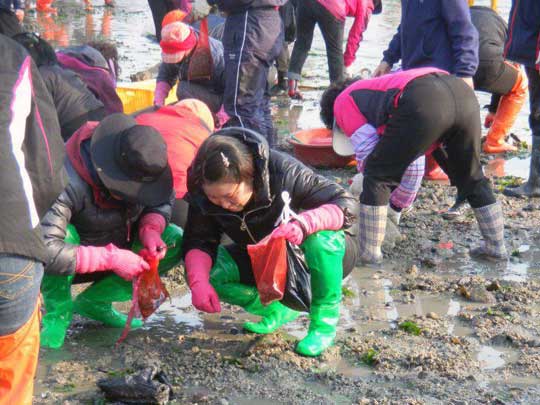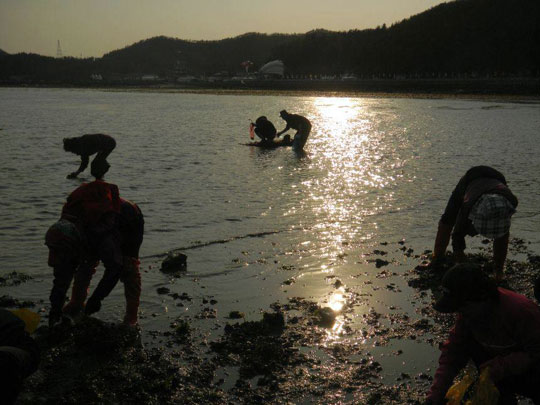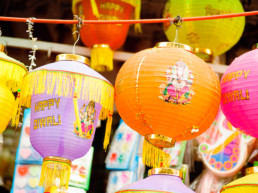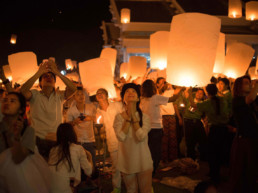If it’s a weekend here in the Republic of Korea, you had better believe that there’s some kind of festival taking place. Whether it be in celebration of newly frozen-over rivers in winter, cherry blossoms exploding to life with spring, the healing and exfoliating qualities of mud during summertime or the, um…unadulterated joy offered to revelers by fermented soybean paste and its associated products come fall, there seems to never not be a good reason to gather somewhere on the peninsula and eat, drink and be merry. But while many of the dozens of annual Korean festivals seem to offer little more than a perfunctory reason for erecting a massive tent city to cater to the thronged masses, one particular yearly event stands head and shoulders above the rest not only for the rare occurrence that it captures, but the centuries-old tale behind it as well.
Jindo Island’s once small and local “Mysterious Sea Way” festival came to international prominence in 1975 when Pierre Randi, then French ambassador to South Korea, described the event in a French newspaper. Likening the spectacle (in which the sea between Jindo and neighbouring Modo Island recedes, exposing a 2.9 km-long, 40 meter-wide causeway) to the famed biblical parting of the Red Sea, “the Korean version of the Moses Miracle” now attracts upwards of half a million foreign and domestic visitors each year – many clad in hideous bright orange or yellow thigh-high rubber boots for the trek between landmasses.
While the waters usually part 2-3 times each spring between the months of March and June, the celebration itself takes place just once per year. The four festival days reach their apex in the late afternoon, when the tides get so low that a land bridge between the islands emerges for approximately 60-90 minutes. At this time, locals and visitors alike can choose either to dig for abalone, clams, crabs, seaweed and other assorted ocean delicacies – which can be cooked to order in any number of tent restaurants afterwards – or traipse along the path once famously trodden in Korean folklore by a woman called Grandma Bbong.
The (Wo)man, the Myth, the Legend
According to an old Korean tale, at the end of the 15th century (during the Joseon Dynasty) a man named Son Dong-ji was condemned to exile on Jeju Island, located a few hours south of the mainland. However, a strong storm shipwrecked Son during his journey through the Yellow Sea down Korea’s west coast, ensuring that he never made it to his final destination. He instead found himself washed ashore in the village of Hoedong (literally “tiger place”) on modern-day Jindo, so-named for the abundance of the ferocious striped beasts that allegedly once roamed the area.
There, Son and his descendants eked out a difficult living amongst the other villagers over the next 200 years. During this time, many fell prey to attacks by the big orange-and-black cats and were brutally killed. Finally, a decision was made for everyone to flee by raft to nearby Modo, where they would be able to live in peace. Unfortunately, an elderly woman named Grandma Bbong was accidentally left behind. She prayed every day to the Dragon King of the Sea, Yongwang, to deliver her safely to her family.
One night in early March the Dragon King appeared to her in a dream, and told her that the next day a rainbow would appear in the ocean to guide her across. She went to the shore the next afternoon and prayed to Yongwang once more. At that moment, the waters parted and a crescent-shaped path linking the two islands appeared. Grandma Bbong dashed across the opening but soon fell victim to exhaustion and the stress of her ordeal. Her family ran out to meet her and she died there in their arms, her final words spoken in praise of the Dragon King for helping to reunite her with her family one last time.
While today’s festival is predominantly focused on “food, fun, and foraging,” many locals still stage shamanic rituals, dances and other performances to honour Grandma Bbong’s unshakable faith in the Dragon King and subsequent sad fate. In fact, a traditional band can be seen playing songs along the ocean road while they make their yearly pilgrimage to Modo, where they pay their respects to the statue of Grandma Bbong’s waiting family on the shore. For many Koreans the sea-parting remains a mystical event, and many come to pray for the well-being of their families and the wishes of their children and loved ones to come true.
What do you think about all of this, Mister Scientist?
For all of you Bill Nye fans out there who demand a slightly more, well, scientific explanation for your natural phenomena, the fine folks over at National Geographic have the Jindo sea-parting break down. Basically, it all comes down to extreme low tides caused by something called “tidal harmonics.” There are several major factors that cause water levels to rise and recede: the gravitational pull of the sun and the moon are the two most well-known, but the Earth’s rotation cycle and the momentum of both the Earth and the moon that results in varying distances between the two rocks also play big parts. All of these factors create different gravitational forces that cause distinct and repeating patterns in the tide. On occasion these factors will all sync up, creating extreme high or, in the case of Jindo, extreme low tides. So, what appears to be a miraculous parting of the sea is in fact an overall lowering of the water level to reveal an elevated ridge of sediment that runs between the two islands.
How to get to the Jindo Sea-Parting Festival
Jindo, South Korea’s third largest island, is in a fairly isolated location off the southwest corner of the peninsula in South Jeolla province. Four direct buses run daily from Seoul to Jindo, while two buses make the journey every day from the eastern port city of Busan. If you’re unable to find a direct bus, consider taking a bus to nearby Gwangju or Mokpo, from which you can catch one of dozens of daily connections the rest of the way. Once in Jindo town, you can take a taxi to the festival grounds, or board a Gagye-Hoedong (가계, 회동) or Songgun-Hoedong (송군, 회동) bus bound for Hoedong (회동). Several tour groups catering to foreign teachers and tourists also provide transportation to the site, including Pedro Kim’s “Lonely Korea” group based out of Gwangju. The date of the Jindo Sea-Parting Festival changes each year, depending on when the extreme low tides take place, so be sure to check online in the spring. Admission tickets are 7,000 Korean won (approximately $6.25 USD), of which 5,000 is returned as a coupon that patrons can use to purchase local products.
Photos courtesy of Natalie Kerr, Alushia Hippler, and Sianna Nelson.
Make your next trip the best one.
Departful is a full service travel agency creating truly exceptional travel experiences that are 100% personalized to you. Wherever you’re going, whatever your interests, we help you plan the perfect trip.
Alex Rathy
Alex is a writer, ESL teacher, baseball enthusiast and Hunter S. Thompson fanatic currently based in Sydney, Australia. He has previously lived in Canada, the U.S., South Korea and China and has traveled extensively throughout Asia. He enjoys hiking, spicy food, dance parties in the jungle, questionable hairdos, Vonnegut novels and has been known to appreciate a good hammock on occasion.
More travel inspiration from Departful
4 Comments
Add comment Cancel reply
This site uses Akismet to reduce spam. Learn how your comment data is processed.








Lhasa is an amazing journey in the dreams of many to undertake one day.
A great way to go there is by train from either
Shanghai, Chengdu or Beijing.
I would recommend this method oof transport because of the fact you can adjust to the higher than normal
altitude.
If you fly in on the other hand the adjustment is to fast for many and will feel sick and not be able to do their
trip.
It takes anywhere from 45-60hours depending onn the season and unexpected occurances.
Many tours companies offer deals for this amazing trip as
we do also. You will be pleased to know we only work with locals.
Putting money back in the pockets of the Tibet people. It is also an amzing spirtual journey for many.
Welcome to book with us anytime.
Hello; can you tell me when this event will happened during 2016?
Hello Ismail! I found a website that claims that the festival this year will be happening from March 20th – March 23rd; however, this is as of yet unconfirmed as the official date. I will do my best to keep an eye on it for you and once they say for sure when it is I will come back and let you know for certain.
[…] Forrás: Departful […]